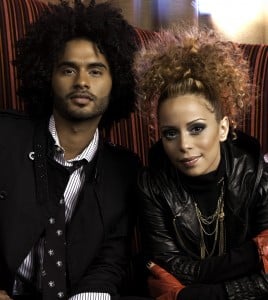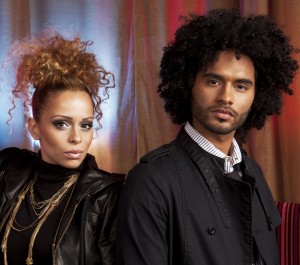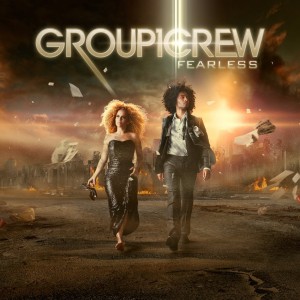
It was late 2006 when I first received a pre-release CD for a brand new artist called Group 1 Crew. I then had the privilege of traveling to Nashville for a showcase hosted by Word Label Group to see the three-piece outfit from Orlando perform alongside Building 429 and Jackson Waters. This might break some sort of journalistic protocol, but I’m going to go ahead and admit that I’ve been a huge fan ever since. The recorded songs were powerful and fresh and seeing the live performance sealed the deal—especially the vocal ability Blanca Reyes (now Callahan).
After the showcase, I sat down with the three members and talked about what challenges they anticipated facing as part of a growing contingency of urban influenced artists trying to make an impact on a mostly pop-rock driven Christian music industry. They seemed confident that they could break down some walls and gain access to a radio market that has for years been dominated by non-RNB artists.
Three albums later, Group 1 Crew (now a duo following the 2011 departure of Pablo Villatoro) has experienced more success than many of its predecessors and hopes to see even more urban artists follow in its footsteps.
In this Whole Notes interview, Group 1 Crew members Blanca Callahan and Manwell Reyes share their personal testimonies, their desire to move Christian music forward, why its important for them to show a different side of hip hop and how marriage has impacted their individual lives:
Chad Bonham: Tell me a little about your individual backgrounds and how you got to this point.
Blanca Callahan: I grew up in a broken home. My parents were divorced at a very young age. My father was heavy into drugs and alcohol and that whole scene. He kind of just trailed off for many years and he did his own thing. We didn’t hear from him much. So as a young girl, you kind of deal with things that you shouldn’t be dealing with. To make a long story short, he had an amazing encounter with God and he felt like it was time to turn his life around. He did a complete 180 and came back to see his kids and apologized for what he had done to his family. Then he started taking me to church.
Bonham: How old were you at the time?
 Callahan: I was in my early teens. But it was a process. Here was this man that I really never knew. And my mom was amazing. She was very open and regardless of the past she let us spend time with him on the weekends. He loved music. That’s where I got my passion for music. He started singing Christian music in the Latin world. He’d bring us to watch him sing and share his testimony. Little by little, God was just working on my heart, because I had a passion to sing, but I wasn’t into the Christian stuff. Finally at 17, I went to a play at our church. It was about Heaven and Hell and I was sitting next to my dad who I never really had a relationship with before and I wanted to be happy. I wanted to give my life to the Lord. I wanted to give my talents and see what He could do with my life. That night, I got saved and never turned. God just placed Group 1 into my life shortly after that and He’s brought me these amazing believers that have built me up and kept me accountable and helped me grow. That’s how I got to where I am now.
Callahan: I was in my early teens. But it was a process. Here was this man that I really never knew. And my mom was amazing. She was very open and regardless of the past she let us spend time with him on the weekends. He loved music. That’s where I got my passion for music. He started singing Christian music in the Latin world. He’d bring us to watch him sing and share his testimony. Little by little, God was just working on my heart, because I had a passion to sing, but I wasn’t into the Christian stuff. Finally at 17, I went to a play at our church. It was about Heaven and Hell and I was sitting next to my dad who I never really had a relationship with before and I wanted to be happy. I wanted to give my life to the Lord. I wanted to give my talents and see what He could do with my life. That night, I got saved and never turned. God just placed Group 1 into my life shortly after that and He’s brought me these amazing believers that have built me up and kept me accountable and helped me grow. That’s how I got to where I am now.
Bonham: What about you Manwell? Were you raised in church?
Manwell Reyes: Neither of us were. I grew up the bad kid. Nobody believes me because I’m such a hopeless romantic now. I’m just soft. But I tried really hard to be hard. I got kicked out of three schools. I was the worst of the worst. I just met God my senior year in high school. It was a 180. Everything I do, I want to be the best at it. So when I met the Lord, I wanted to be the best. That really carried me through my walk. I went to Bible college and after that is when we put Group 1 Crew together.
Bonham: Where did you first meet?
Reyes: We met a Bible study at our friend Paul’s house. He went to Bible school with me. When we got finished with Bible school, we had an idea to just link all the artists in Orlando. Through mutual friends, we all knew one another and we were trying to do this or trying to do that. It just made sense for everybody to come together and do something under one name to make an impact in Orlando. That’s really all we were trying to do—be good in Orlando.
Bonham: When I first met you guys back in 2006, you talked about the musical diversity within the group and how it impacted your music. Would you say that the evolution of your music is directly related to all of those influences coming together over a longer period of time?
Reyes: I’d say that’s pretty accurate.
Callahan: I think more and more every year, we grow musically into our own. When I was 17, I was just trying to figure out who I was and what God wanted to do with my voice. So every year, Group 1 just forms itself around what God is trying to speak through us and who we are becoming as artists. It’s a cool thing.
Bonham: When you first hit the scene, there weren’t many urban leaning artists that had experienced much success within the contemporary Christian industry as far as record sales and radio play go. What have you learned over the past few years about how much work it takes to break down those walls and convince people that you belong?
 Reyes: It’s always a frustrating thing to feel like you’re good enough to be somewhere but then you’re not—especially in our genre. It’s very particular in what it sees as being the main act. Everything is obviously skewed to rock and roll. There are occasions that we feel like the outsiders or the outcasts, but we just try to remember to run our lane. When we first signed to a label, we were just hoping we’d sell 30,000 records and we doubled that. We’ve been doing it ever since. We stopped fighting the beast and started accepting what God was doing. Now we’re moving to a place where we’re realizing that our music is no longer about genre or our own personal political motives within the Christian arena. It’s becoming music as a necessity, because the reality is our genre is so small. If the Christian CCM world is a sub-genre of the mainstream world then rap is a sub-sub genre of the CCM world. Now we make music for the need because we know that there’s a place for us. What happens after that, like what tours we get on or what we shows we get, we realize it’s not up to us. We can’t force people to like us and we can’t force people to put us on tours. We can only make the best music we can and live the best that we can.
Reyes: It’s always a frustrating thing to feel like you’re good enough to be somewhere but then you’re not—especially in our genre. It’s very particular in what it sees as being the main act. Everything is obviously skewed to rock and roll. There are occasions that we feel like the outsiders or the outcasts, but we just try to remember to run our lane. When we first signed to a label, we were just hoping we’d sell 30,000 records and we doubled that. We’ve been doing it ever since. We stopped fighting the beast and started accepting what God was doing. Now we’re moving to a place where we’re realizing that our music is no longer about genre or our own personal political motives within the Christian arena. It’s becoming music as a necessity, because the reality is our genre is so small. If the Christian CCM world is a sub-genre of the mainstream world then rap is a sub-sub genre of the CCM world. Now we make music for the need because we know that there’s a place for us. What happens after that, like what tours we get on or what we shows we get, we realize it’s not up to us. We can’t force people to like us and we can’t force people to put us on tours. We can only make the best music we can and live the best that we can.
Bonham: Were you excited to see a hip hop artist like Lecrae get a Dove Award nomination for Artist of the Year?
Reyes: The more I try to think about Lecrae, the more I think you shouldn’t try to figure it out. How he’s doing it is such a God thing. He’s just a good dude and everything that he’s doing and the walls that he’s breaking down is monumental for us as people of God. It’s just one of those things where you sit back and love it. Everybody wants to be that person but for one reason or another, there can only be one Lecrae and there can only be one Group 1 Crew.
Bonham: About 15 years ago, dcTalk took a chunk of the wall down with “Jesus Freak” and then Kirk Franklin came along and took down another piece of the wall. It seems that artists like Lecrae and Group 1 Crew are collectively swinging the hammer at another section. Do you feel like that’s part of your calling—to break down walls within the Christian music industry and beyond?
Callahan: I never knew that was going to be part of our job in this whole thing. When we first started, I didn’t know half of the Christian artists because I was so new to it. I heard of people like Grits and Cross Movement who had gone before—people like dcTalk and TobyMac. They paved the way to give us an opportunity. Little did we know that we would paving the way for so many other artists that are coming behind us. It’s been a lot of new territory that Group 1 Crew has found itself in. No one has ever really done this and the label was saying, “We don’t know, but let’s try it.” Everybody is willing but there has been a lot of breaking down walls and entering new territory where we’ve never been.
Reyes: We’ve exceeded our label’s expectations and there’s literally nothing out there that sounds like us. Even if you look across the board in secular music, we get compared to the Black Eyed Peas but name a single band that sounds like the Black Eyed Peas or us. But the label is trusting us even more now than ever. We told them with the last record, “Don’t talk to us. Don’t ask for music. We know exactly what you need.” And they totally trusted us and just left us alone and we handed them what we feel is our best record to date.
Bonham: What are some of the specific messages you try to convey to young people as a counter to what they might be hearing from the general market?
 Reyes: Obviously we pull from our personal views and perspectives. We like pushing the envelope even though on the global scale what we’re doing is tame. But we do like warming people up to a different side of Christianity. This might seem trite, but I’ve always compared Jesus to sunglasses. We all see Christ through different eyes depending on who you allow into your life. If you put on Group 1 Crew shades or Building 429 shades, there’s a different tint to how you see God. We obviously have a different tint. So when you put on our shades, our goal is to help you see God in a different way. We enjoy being that. We enjoy being different. There are so many people that live Christianity based on what direction the masses are going. I love to confront every ideology and ask, “Do I believe that and why?” Even with our music, you can become scared of what people think and what people are going to say. But man, who wants to become a slave to another Christian. We’re supposed to be serving others but we’re not supposed to be enslaved by their opinions. It’s one of those things we’ve been working on, just trying to have the freedom to be who we are. Music is spirit. Music is not words. Every song is produced with some kind of spirit. It’s intended to invoke an emotion. Because we follow Christ and we want to live our lives wholly to Him, every song we write is a Christian song whether we’re talking about shoes or whether we’re talking about the cross. It’s a Christian song because it’s coming from a Christian heart.
Reyes: Obviously we pull from our personal views and perspectives. We like pushing the envelope even though on the global scale what we’re doing is tame. But we do like warming people up to a different side of Christianity. This might seem trite, but I’ve always compared Jesus to sunglasses. We all see Christ through different eyes depending on who you allow into your life. If you put on Group 1 Crew shades or Building 429 shades, there’s a different tint to how you see God. We obviously have a different tint. So when you put on our shades, our goal is to help you see God in a different way. We enjoy being that. We enjoy being different. There are so many people that live Christianity based on what direction the masses are going. I love to confront every ideology and ask, “Do I believe that and why?” Even with our music, you can become scared of what people think and what people are going to say. But man, who wants to become a slave to another Christian. We’re supposed to be serving others but we’re not supposed to be enslaved by their opinions. It’s one of those things we’ve been working on, just trying to have the freedom to be who we are. Music is spirit. Music is not words. Every song is produced with some kind of spirit. It’s intended to invoke an emotion. Because we follow Christ and we want to live our lives wholly to Him, every song we write is a Christian song whether we’re talking about shoes or whether we’re talking about the cross. It’s a Christian song because it’s coming from a Christian heart.
Bonham: Both of you have also gotten married since the first album. What blessings and challenges has that change brought to your individual lives?
Callahan: My husband is actually our drummer. It helps a lot. The bonuses are that we were able to spend the last two years together from the beginning. It’s a lot of building and it’s been great for our marriage. A difficulty would be, because he’s my husband, it’s finding the balance between business and family. He’s always going to fight for me. He’s always going to want what’s best (for me), but at the end of the day, (Manwell and I) are like a family as well in this business. That’s been difficult at times, but for the most part, I love it.
Bonham: Manwell, you’ve been married more recently. How has that changed your life and how has it impacted what you do as an artist?

Reyes: It’s been cool. She loves God and the cool thing is I feel conviction everywhere I go as if she’s right there with me telling what I’m doing wrong. No matter what, I feel like she’s always with me.
Bonham: She’s like the Holy Spirit’s wingman.
Reyes: She really is! I have this awareness of what I’m supposed to be doing, how I’m supposed to be talking, how I’m supposed to be living. I had horrible habits in the past and without her even having to try, she’s already made me a better person. I love it. I love the idea of having a partner—someone who supports you and just holds it down when you’re not able to hold it down. Our first year of marriage, we probably spent a total of four months together, maybe. That’s being generous. But it feels good to have someone who offsets my lack. When we first got married, I was like, “Babe, these are my plans for the year. These are the tours we’re going on and we’re not going to get paid anything. We’re about to get paid zero money. I just want you to know that before we get into this.” She said, “That’s fine. I love you.” And she holds it down. I’m not used to that. I’m used to stressing. Before we had a business manager, I used to handle everything about the business and it was so stressful. But this year, I’ve just learned to let go and she’s helped me to let go. It’s been a blessing.
Stay up on the latest from Group 1 Crew by visiting the official website HERE.

